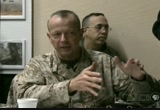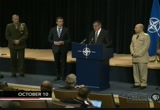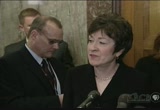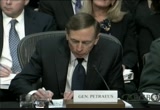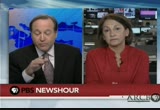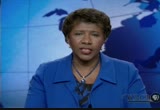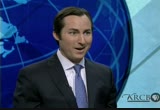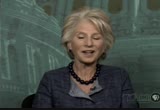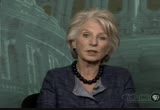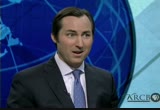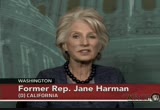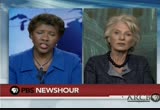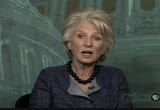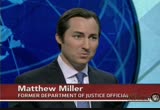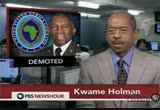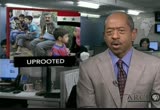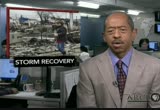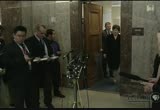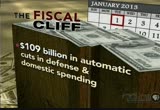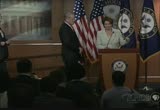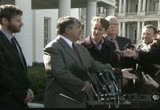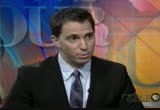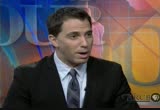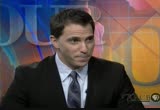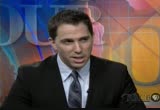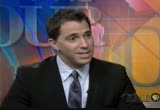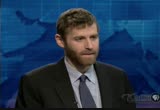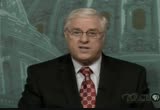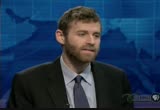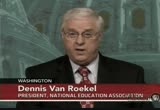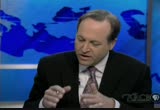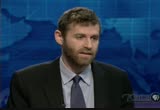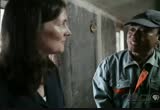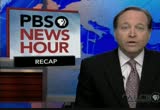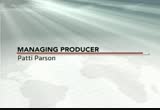tv PBS News Hour PBS November 13, 2012 5:30pm-6:30pm PST
5:31 pm
captioning sponsored by macneil/lehrer productions >> ifill: general john allen, the top u.s. commander in afghanistan, is under investigation for sending messages to a woman linked to the scandal that forced c.i.a. director petraus to resign. good evening. i'm gwen ifill. >> brown: and i'm jeffrey brown. on the newshour tonight, we get the latest on what were termed "potentially inappropriate" e- mails and documents, and we examine if and when the white house and congress should have been alerted. >> ifill: then, the senate and the house of representatives get back to work. judy woodruff looks at the long list of challenges ahead. >> brown: one item on the agenda is the so-called fiscal cliff , and that was the focus of a white house meeting today with liberal leaders. we talk with two participants. >> ifill: plus, from "our food for nine billion" series, special correspondent mary kay magistad reports on china's moves to satisfy a growing demand for meat. it has transformed lives and diets over the past 30 years meat con suption per cap to has quadrupled and city dwellers eat twice as much meat on average as those in the countryside. >> ifill: that's all ahead on tonight's newshour. major funding for the pbs newshour has been provided by:
5:32 pm
moving our economy for 160 years. bnsf, the engine that connects us. >> intel. sponsors of tomorrow. >> and by the bill and melinda gates foundation. dedicated to the idea that all people deserve the chance to live a healthy, productive life. and with the ongoing support of these institutions and foundations. and... this program was made possible by the corporation for public broadcasting. and by contributions to your pbs station from viewers like you. thank you. >> brown: the investigation that
5:33 pm
felled the head of the c.i.a. has expanded, to include a high- ranking u.s. military figure. thanews rippled outward fro the pentagon today, and across official washington. the name of u.s. marine general john allen, the top american commander in afghanistan, surfaced overnight in the scandal that began friday with david petraeus resigning at c.i.a. director. unnamed defense officials say the military is now investigating possibly, quote, inappropriate communications between allen and tampa socialite jill kelley. she had reported getting harassing emails from another woman, paula broadwell. the f.b.i. investigation that followed uncovered broadwell's affair with petraeus. but according to the newest revelations, agents also found extensive contacts between kelley and general allen. the f.b.i. notifieded the pentagon on sunday. last night spokesman george little read a statement from
5:34 pm
defense secretary leon panetta on a flight to australia. >> today the secretary directed that the matter be referred to the inspector general of the department of defense for investigation. it is now in the hands of the department of the secretary-general. >> brown: early news accounts said allen andkelley exchanged 20,000-30,000 pages of emails and other documents over the last two years. for part of that time the general served as deputy commander at u.s. central command faced at the air force base in tampa. jill kelley and her hus ban often organized social events for the military. one senior defense official said today that the emails between allen and kelley were mostly routine and involved planning for parties. another described them as, quote, flirtatious. for his part allen denied any wrongdoing. the four star general took over command in afghanistan in july of 2011. from then general david petraeus. >> it is my intention to maintain the momentum of this
5:35 pm
campaign. this great comain on which we have embarked. >> brown: in that role allen is also overseeing the pullout of u.s. combat forces and transition to an afghan takeover of security by 2014. >> what the people of afghanistan want is to be protected by afghans. what the international community wants is for the afghan people to be protected by afghans. that's an important outcome. that is what victory loo lke in the fight against the taliban. >> brown: last month allen was nominated for supreme commander of nato, a role he was expected to assume in the spring. now his confirmation process has been put on hold. pentagon officials say they hope to speed up confirmation of general joseph dunnfordford as allen's successor in afghanistan. at the white house today, press secretary jay carney said president obama still has faith in general allen and is not contemplating shake-ups in his national security team. >> he's focused on th mssions that the military has passed
5:36 pm
with care... is tasked with carrying out and the c.i.a. and the general intelligence community, the tasks they're carrying out. and with enacting his overall agenda. >> brown: meanwhile the petraeus probe continued. f.b.i. agented searchd the home of paula broadwell in charlotte, north carolina late last night. at the u.s. capitol today, returning lawmakers were still looking for answers. one was republican senator susan collins of maine. >> i am puzzled by much of what has occurred in the f.b.i. investigation and also the latest information that perhaps general petraeus' friends had access to some classified information. we don't know whether that is true or not. >> brown: others including house minority leader nancy pelosi focused on why the f.b.i. did not officially inform congress
5:37 pm
about the petraeus matter much earlier. >> i think there's some answers that we have toave about notification to congress. i don't have any reason to think that there are any national security issues at stake in what has transpired. i think some dishonorable things were done, and the honorable thing has to be resign and not to go forward. >> brown: in the meantime democratic senator dianne feinstein, chair of the intelligence committee, said she now expects petraeus will testify about the attack on the u.s. consulate in benghazi, libya, even though he's no longer head of the c.i.a. in a final strange twist, there was also news today about the f.b.i. agent who was first contacted by jill kelley last may. the wall street journal reported that he had once sent they are shirtless photos himself. for more on all of this we turn once again tonight to sari horwitz, an investigative reporter at the "washington post."
5:38 pm
potentially inappropriate communications between general allen and jill kelley. what does that mean? what do we know so far? >> well, it's interesting because one man's potentially appropriate email is another's friendly banter, maybe flirtatious banter. but people in the allen camp in washington and people who represent kelley, she's hired a lawyer and a p.r. representative, both people say that there was no inappropriate relationship. there was no affair. it was a practice tan i can friendship. it's so interesting because this scandal that is rocking washington and has led to the downfall of petraeus and is raising questions about john allen all started with this tampa party soci scene in which jill kelley was the key player. >> brown: what do we know about jill kel he'll at this point? >> here's what we know. she was an add hock kind of social ambassador with the military and their wives, the
5:39 pm
generals based in tampa. she was a volunteer at the mcdill air force base which is located next to her mansion. she and her husband scott who is a surgeon in tampa threw these lavish parties with the military. cigars and champagne and string quartets. and they were friends. they socialized. she obviously liked to send emails. she sent many many emails to general allen. we've heard 20,000-30,000 pages of documents. those aren't all emails but many of them are emails. >> brown: there's a lot of to and fro on it. 20,000-30,000 sounds like an awful lot. >> i think it's more accurate to say 20,000-30,000 pages of information, probably hundreds of emails between them. you know, some of them are friendly. we ow us the word "sweetheart" in one or two or three of them, maybe more. what his friends say is he was sort of a gentleman, a southern
5:40 pm
gentleman. that's a term he would use. it's real he'll just a friendship. and platonic relationship. the f.b.i. turned over this information to the department of defense because there are no criminal charges. there are no national security issues is what they tell me. but they thought that the department of defense should have this material because it does have to do with a key commander. >> brown: that's exactly what i was going to ask you about, turning that decision to turn it over. let me ask you about the other as we said at the end of that piece the strange aspect of the f.b.i. agent who first was contacted by jill kelley and their relationship such as it is or might be. what do we know? does that have any particular bearing on all this? or is that just a strange detail? >> strange detail. he's an interesting character in this whole story because it may not have become public if not for that agent. he was also part of the social scene.
5:41 pm
he was friends with jill kelley. as friends, they were talking in june. she said, you know, i'm getting all these really bizarre, harassing emails, what should i do? he said i'll take it to the bureau. he takes to it the tampa office of the f.b.i. to the cyber crime division which they have there. he was not one of the investigators on the case. he brought it to them, but then the case moved forward. he later learned from the agents that it involved broadwell becausehey uncovered the ti to broadwell and it involved petraeus. he was upset at the slow pace that he believed the investigation was taking. he was frustrated. he called a friend of his who called a lawmaker in washington state who called eric cantor on capitol hill. and this agent said, this could be a matter of national security. what do are we doing about this? it involves general petraeus. eric cantor's chief of staff then called the chief of staff of the f.b.i. director, robert
5:42 pm
mueller. >> brown: speaking of broadwell, you're ging back to whe things stand on the petraeus investigation. what do we know about why f.b.i. people were at her house? what were they looking for last night? what was that all about? >> another fascinating development last night. it happened late. that is part of the ongoing investigation. while general allen is not part of the ongoing justice investigation, paula broadwell still is. she had classified documents, they discovered, in the course of looking at her emails. she had classified documents. in her interview with the f.b.i., broadwelsaid th she did not get the documents from general petraeus. they interviewed general at the tray us who said he did not give the documents to paula broadwell. so the question for the f.b.i. is where is she getting the classified documents? and why does she have them? it was not a raid. she gave them the keys to her house. they went... the f.b.i. in
5:43 pm
charlotte north carolina where she lives, they went with boxes, pretty dramatic for the press there. they took photographs of the outside and the inside of their house. they had big duffle bags. they took o all the documents. they're trying to find out if there was some kind of security breach with these classified documents. >> brown: all right. a lot to keep up with, sari horowitz, thanks again from the "washington post." thanks so much. >> sure, thank you. >> ifill: house and senate leaders are complaining that congress and the white house were kept out of the loop on these high-profile investigations. we wondered, how does that work? for that, we turn to jane harman, the former ranking democrat o t hose intelligence committee, now c.e.o. of the woodrow wilson center. and matthew miller, who served as director of public affairs for attorney general eric holder at the department of justice until last year. matthew miller, is there anything unusual in that story that sari just laid out for us about how this case and how this investigation unfolded? is is there anything about how that played out that strikes you
5:44 pm
as unusual. >> i think everything about this case is unusual. there's not a lot of precedent to look at with a case like this. it really does seem to be an unprecedented case. but you look at the principles that the department follows when they conduct these types of investigations. one of the principles that they follow is that they don't share information about oni crinal investigations with people outside law enforcement while those investigations are being conducted. they do that for a couple of reasons. one quite frankly is to protect the reputation of people who may have committed no crime but would see their reputations unfairly maligned the second is to insulate their investigations from any political pressure. so particularly when it's a member of the administration being investigated, it's dangerous. other people in the admistration, yourie them and other people in congress, you could potentially see those investigations politicized. >> ifill: jane harman, how does
5:45 pm
that strike you? >> i was the ranking member on the house intelligence committee for four year. i served on the committee for eight years. in my ranking member position, i and the chairman were briefed regularly by the f.b.i. on pending high-level cases. but those cases involved counterintelligence or counterterrorism. i don't think that was this case. i do think there are bizre issues here. it started out, so far as i can tell -- and i'm not sure i've got it all down here -- as an investigation into alleged cyber stalking by paula broadwell. that led to the rest of this material. as matthew miller just said, if a crime... an alleged crime was being investigated, it would be improper to tell anybody about it. that could blow the investigation. there also wasn't so far as anyone has said any counterterrorism or counterintelligence charge against david petraeu so at tat point, i see no
5:46 pm
reason why congress should have been told about it. however, at some point, the f.b.i. not only told a couple members of congress including eric cantor but then told the director of national intelligence, jim clapper, about petraeus' involvement. i think congress has every right to understand what this process was, who this perhaps rogue agent who i just learned from your broadcast was friendly with the other woman involved here. congress has every right to get to the bottom. i think that osed hearings which dianne feinstein the chairman of the senate intelligence committee and saxby sham bliss the ranking member, bipartisan closed hearings are the way to go. hopefully this feeding frenzy about material that at least i would hope would take up less time on our air waves very soon will end. >> ifill: matthew miller, are you saying that the circumstances under which congress would be notified would be that there had to be proof, some conclusion that there was
5:47 pm
criminality involved. >> i think if they had developed information that there was an active national secury threat, they likely would have briefed the intelligence committee as they're requiredded to under law. but this started as the congresswoman said as a cyber stalking investigation. they then moved to look and see whether any classified information had been improperly disclosed. >> ifill: would a cyber stalking investigation be treated differently than a potentially national security breach? >> of course. when they started this they thought this was a complaint from one woman not really connected to the government about anonymous harassment emails. they only later learned of general petraeus' involvement and it was even later than that they learned of the affar. actually not until late october that the general confirmed that he had had an affair at which time i think they faced the choice, it seemed like they were sure by then they weren't going to charge anyone with a crime. they had to decide what to do with the information about the general's affair. they eventually notified the director of national intelligence. >> ifill: nancy pelosi said
5:48 pm
today and dianne feinstein is not happy either, said today it would have been nice to hear about this before she heard about it on tv. at what point... explain to the people who don't get the way this works what the oversite role of the congressional committees, when they're supposed to be told and when it would be politically unadvantagous in terms of looking like you were trying to taint an investigation not to tell members? >> well, i think i answered most of that in my last answer. but if it's an ongoing criminal investigation not involving the head of the c.i.a. or somebody of that kind, i don't know what the obligation was to tell congress anything. by the time, however, that that... that this perhaps rogue f.b.i. agent in florida who lives in tampa and was friendly with e oer wan involved in all this called dave rickard, a former sheriff and member of congress from washington state who called eric cantor, then this was a highly irregular process. going to jim clapper when the
5:49 pm
f.b.i. did on election day i don't quite understand that either. at this point, i feel strongly as dianne feinstein does that her committee has to right to understand what the process was, whether it complied with f.b.i. procedure. i think some pieces of this didn't. >> ifill: you mentioned... and to lenll the material. as i said before though, gwen, congress is typically not advised. i don't see why the intelligence committees would be advised. >> ifill: but you mentioned the election day notification, jane harman. are you worried at all that there may be the appearance of a political taint here? >> well, it was election day. i somehow think there may be the appearance of it. but i don't think that was anybody's intention. i think this was... i think congress should get to the bottom of it. if ere are investigations that involve the transfer of classified material, involving high-level officials or members of congress, absolutely.
5:50 pm
congress has to be briefed. and surely in a more timely way. congress shouldn't be playing catch-up. that's obviously something congress hates but again to put this in perspective, dave petraeus has resigned. there are issues about whether he had to resign. i assume that was his personal decision. it was the recommendation of jim clapper that he do so. there will be an orderly transition at the c.i.a. i am on the.i.a. external board. i'm also a personal friend of holy and dave petraeus. i have to say that. but i think before this happen happened, dave petraeus brought a different style to the c.i.a. but was doing a very good job of formulating strategic directions for the c.i.a. and staying on top of the world hot spots, something he's very good at. our intelligence products are better and better. there are obviously lapses. we'll have to learn more about the benghazi situation but by and large the c.i.a. is doing an excellent job as we speak there are c.i.a. employees working
5:51 pm
around the world to keep us safe. they should know that this what i would call a media circus will end soon. >> ifill: matthew miller, can you ask something about what has been overlooked. that's the degree that the government has access to private exchanges. it seems we're finding out that there is an awful lot of that. is that unusual? is that something people should be more aware of? >> i think what people need to understand is that the government only has access to those... to their private emails through lwful ahorized channels. in this case it appears that they got a search warrant approved by a court to access these emails which they did. not because they were trying to find out whether david petraeus an affair but because they were worried about cyber stalking allegations. against jill kelley in florida. so they were investigating a crime and pursuing avenues of investigation that they do in other circumstances, but certainly people, you know, do need to be aware that, you know,
5:52 pm
if you're committing a crime you don't want to do it over email because the government will find out. > ifil matew miller, and jane harman former house member, thank you both very much. >> thank you. brown: online >> brown: online, we've updated the timeline of events in the unfolding scandal. and ahead on the newshour, a full plate for the lame duck session of congress; a white house meeting about the fiscal cliff; and the demand for meat in china. but first, the other news of the day. here's kwame holman. >> holman: another army general, william "kip" ward, has been demoted for unauthorized expenses, and ordered to repay $82,000. the associated press reported today ward was accused of spending lavishly on travel and other items. ward is former head of u.s. africa command. the demotion strips him of a star, meaning he'll retire as a three-star lieutenant general. the u.s. army has wrapped up a
5:53 pm
hearing for a soldier accused of a massacre in afghanistan. staff sergeant robert bales is charged with killing 16 afghan civilians last march. most of the victims were children. the hearing took place at joint base lewis-mcchord, near seattle, washington. if the case goes to a court- martial and bales convied, he cou face the death penalty. some two and a half million people have been uprooted from their homes in syria by the raging civil war. the syrian arab red crescent made that estimate today. it's more than double the previous estimate used by aid agencies. in addition, more than 400,000 syrians have fled to neighboring states. it's been two weeks since hurricane sandy walloped the northeast, and, as of today, more than 130,000 homes and businesses across new york and new jersey still were in the dark. new york city mayor michael bloomberg warned again the process of restoration and recovery will be slow. . a lot of residents unfortunately will be out of power for a long time. but rather than complain about it or even write about it, we're
5:54 pm
trying to do something about it. we can sit around and bring or hands and say it's terrible. mother nature brought us this storm. now we're just going to deal with it. we're going to go methodically street by street building by building and help people get going. we're going to do the most important life-threatening things first. and then we'll come back. we're not going to stop until everybody is back. >> holman: there also were more signs of progress today, as gasoline rationing ended in central and northern new jersey. rationing continues in new york city. wall street slid again today, amid concerns about impending spending cuts and tax increases in washington. the dow jones industrial average lost nearly 59 points to close at 12,756. the nasdaq fell 20 points to close below 2884. those are some of the day's major stories. now, back to gwen. >> ifill: capitol hill was back in business today, as lawmakers began tackling what promises to be a full agenda for what's left of the legislative year. judy woodruff has our look.
5:55 pm
>> woodruff: with the long campaign break finally over, congress came back to washington today for the lame duck session. the first order of business was welcoming newly elected members. >> the united states senate cuff links. that's beautiful. >> welcome to the club. ifill: republican senator susan collins of maine traded gifts and pleasantries with her state's incoming independent senator, angus king. afterward king said he still had not made a final decision on which party he would caucus with. >> whichever decision i make, i am not declaring opposition or inability to work with or unwillingness to work with the members of the other party. >> woodruff: senate minority leader mitch mcconnell sat down with the three confirmed additions to the republican conference. he said it was time to tackle the nation's problems. >> the country has extraordinarily diffult set of
5:56 pm
challenges facing us over the next couple of months. the election is behind us. we're ready to get started. >> woodruff: the most difficult of those challenges will be reaching a deal to avert a so-called fiscal cliff. starting january 1, some $500 billion in tax increases will take effect with the expiration of the bush era tax cuts and the payroll tax holiday. at the same time automatic spending cuts will hit defense and domestic programs totaling $109 billion. the spending reductions were triggered when the congressional super committee failed to reach a broad deficit deal last year. that came after talks broan down between the president and house speaker john boehner. senator collins told the newshour today that she's optimistic lawmakers can still strike a deal and stave off the spending cuts. >> so this has to be done carefully. i think the president's right
5:57 pm
that -- and i've said this for a long time -- that we have to look at both revenues and spending. but there eds to be compromise on both sides. >> woodruff: but mcconnell said the president needs to put a proposal on the table if any agreement is going to pass. >> the time for the president to lead is now. that means offering a concrete plan that takes into account the fact that half the congo poses tax hikes. >> woodruff: on the democratic side house minority leader nancy pelosi rejected calls by some in the party who have argued for letting the country go over the cliff to get a better deal. >> i want you to b disabused any notion that there's any widespread thought that it would be a good as a country for us to go over the cliff. we want an agreement. we want an agreement. >> woodruff: law mangers will have to try to differences on the fiscal cliff and other issues with one eye on the clock. right now the house plans to
5:58 pm
recess next week for the thanksgiving holiday. currently it has only three more workweeks left this year. the senate meanwhile has yet to set a target adjournment date. and there is pressure from outside groups. president obama met privately today with leaders of liberal organizations and labor unions, including richard trunka head of the afl-cio. >> we're going to work together because we have the same goals. that's protecting the middle class. that's creating jobs in this country and making sure that social security, medicare and medicaid, the beneficiaries don't get hurt. >> woodruff: the president is expected to hear from business executives tomorrow. he will sit down to face with congressioningal leaderson friday. >> woodruff: here now to walk us through the issues on congress' lame-duck agenda is todd zwillich, a reporter for the pri's "the takeaway" on wnyc radio. todd, welcome back to the newshour. >> good to be with you, judy.
5:59 pm
woodruff: the election was a week ago today. what has changed since congress last got together on all these questions? and was it a complete impasse? >> well, two main things have changed. one you just mentioned. the election. president obama and democrats won that election. really president obama won it big. it's relevant in this case largely because he ran on an explicit agenda of having tax rates for the wealthy go back up. that's what this negotiation largely, not exclusively, but largely is all about. so president obama's coming to the table saying, hey, republicans we didn't reach an agreement with the super committee. we didn't reach an agreement with the biden talks. we didn't reach agreement largely with debt limit fights from those years ago. i just won. i ran on that. so this is my hard position. another thing has changed in addition to the election. it is the fiscal cliff that you mentioned inhe set-upthere. we are now much closer to the deadline of those bush era tax cuts going up. and the leverage has now
6:00 pm
changed. if there is no agreement at all by december 31, all of those rates go up. that fundamentally changes the debate over who can vote for a tax increase and when. one of the kujals being put forward by a lot of liberals on the hill -- there's a little bit of good cop bad cop going on. you heard nancy pelosi saying nobody wants to go over the cliff. tre is odop bad cop going on. i bring it up for this reason. after january 1, there are a lot of republicans who won't vote for a tax increase. there are liberals on the hill saying that's fine. after january 1 all the tax rates go up. then every vote is to bring tacks back down. you can have all the tax cut votes you want. that's changed too. the leverage has changed there. >> woodruff: is it clear whether the president has more leverage or not. you started out suggesting he does have more cards to play this time. but on the other hand he can't... they can't guarantee the republicans are are going to go along. >> no. there's never a guarantee.
6:01 pm
it's a matter of going straight to the public for one thing and saying i ran on this, you elected me. this is my agenda. and he does have more leverage. he has more leverage. if you don't want to call it an electoral mandate because that's a loaded word especially in washington. you can say he did run explicitly on this. that sort of damocles, that fiscal cliff and also the sequester enforcement mechanisms which will cut spending immediately, members do not want that to happen. thas levege too >> woodruff: we already hear some republicans changing their tune. speaker boehner is talking about closing loopholes. other republicans are saying maybe like they're prepared to look at revenue. what are... are there concrete examples there that have the makings of some kind of deal down the road? >> very little is concrete at this point. but the movement from saying we don't want government to grow at all. the answer to this fiscal crisis is not to grow government to the position that you're hearing
6:02 pm
from leadership now which is, yes, we can have revenue. that's part of a broader deal that we're going to make. that's a bstaial shift. that's not the same thing as the fight over tax rates, income tax rates. the president has said i will sign no deal that doesn't bring the income tax rates for the top earners back up to 96.5%. that's a slightly... there's a new nuance there that gives politicians wiggle room over what the definition of revenue is, but there has been movement on that. there's been even more movement. you heard a prominent republican on the sunday shows, bill kristol a prominent conservative spokesman. republicans ke tsdeal. it won't kill us to let tax rates go up on the very rich. he doesn't have a vote in congress but he can offer plit cover if republicans choose to run under it. they haven't. they might. >> woodruff: the vast majority of republicans are still saying no tax rate increase. the president is saying there has to be a tax rate increase. why are they just as far apart as ever?
6:03 pm
>> they're pretty far apart. i don't want to give the impression they're not. there is movement on the idea of being able to have revenue. how do you get revenue without raising tax rates? well you mess around with the tax code. there are lots of loopholes and speclfavors and x expenditures in the tax code. if you close those up especially at the top end of the income bracket, you can get a lot of money for the federal government without saying you raise taxes and without having it show up in the margins on the tax rates. that might be important to a lot of politicians. >> woodruff: in other words you may not get as much as the president right now is talking about 1.6 trillion in tax increases but you could some of it. talk to us, todd zwillich, about the timing here. they're in session three more days this week. as we just mentioned, three weeks afterwards. is ha enough time to get th done. >> anybody could pull a rabbit out of a hat and say we had a basis of some agreement because we've done this debate before. we've had these biden talks. we've had this super committee. we have a basis that we can talk on. it's possible.
6:04 pm
they reach a grand bar gabe. it's not likely to reach a big deal that would include at republicans' insistence curbs on medicare spending, social security, major political third rails not to mention tax rates and a bunch of other sundry items that we haven't talked about. these money things that sort of lurk in the tax code and sort of behind our politics it's unlely getll o that. but they really really want to avoid the defense sequester. that $109 billion that gets cut right away allotted from defense and domestic spending. what they could do and what will be more likely if they can't pull the rabbit out of the hat. congress makes the laws. they can do something smaller. they can do a smaller deal that plugs that defense sequester, tets them past january 1 to say defense won't be cut drastically. here's the parameters of a bigger deal we'll do next year. second do that too. >> woodruff: they would go over the cliff but they would have a pachut >> in a way. and the cliff itself i want to say is a little bit misleading. i think the idea of a fiscal
6:05 pm
cliff, the imagery of it is scary. it does serve politicians who have a sense of urgency. not to say it's not serious. it's really a slope. one doesn't fall off it into an abyss where the markets tank and the dome pops off the capitol. it's rea really a slope. even if they do go past the so-called cliff and tax rates do go up, keep in mind if congress were to get a deal shortly after th it wouldn't affect tax rates in 2012. those end on december 31. if they got a deal earlyish in the year after january 1 that would be retroactive from the standpoint of tax payers. >> woodruff: that's somewhat reassure to go know it's a slope and not a cliff. we can continue discussing the geography. todd zwillich, thanks very much. >> my pleasure. brown: since the >> brown: since the election, we've sampled different views about what the president and congress should do facing the so-called fiscal cliff. those include the c.e.o. of aetna insurance, one of seval
6:06 pm
buiness leaders meeting with the president tomorrow; the leader of a centrist think tank called "third way"; and a panel of three republicans on how their party should respond to last week's vote. as we heard from judy, president obama met with leaders of labor and liberal groups today at the white house. we're joined now by two who were there. dennis van roekel is the president of the national education association, with some three million members, including teachers. it's the largest labor union in the country. and justin ruben, executive director of move-on.org, a political advocacy group. nt to start with you. what was the key message that you brought to the white house and wanted the president to hear today? >> i brought the message that, number one, it's important that we let the bush tax cuts disappear for the wealthiest 2%. as we're looking for a 1.2 trillion dollar solution, 829 billion takes us a long way there. i also brought a message that there are other areas of taxes that we looked at that need to
6:07 pm
be... look at the fairness issue. president obama not only won this election but so did his ideas and his values. thameran peopleant fairness. they want everyone to pay their fair share. one of the things that is very unfair in this country is if you earn your income through work versus those who earn their income through wealth. if you work as a policeman, a plumber, a teacher, a nurse, you're taxed at a certain rate but if you earn your income through dividends or capital gains, they tax it as a lesser rate. warren buffet said why in the world should his secretary pay less tax? i also brought to them the idea that in corporate tax reform number one we have to change the offhore loopholes which will generate over $30 billion. what we also have to do is is make sure that the corporations who earn billions of dollars pay some tax and now they're paying none. >> brown: let me bring in justin ruben because your group issued a statement afterwards agreeing with the president's stance on
6:08 pm
taxes but you also said our members are committed to defending medicare, medicaid and social security from any benefit cuts as part of the budget deal. any cuts? is that a line that you have? >> i think there are two things rememr here. first we said benefit cuts. there's no question that we need to... the growth of medicare is unsustainable. we need to bring down the cost of health care in this country. that's the way to control medicare costs not to ask people who are sick and who need care to go without. but i think the second thing is if you step back and look at this fight overall, it's a really a priority question. we have these budget challenges. how are we going to solve them? are we going to ask, you know, are we going to ask people who areakin millionsf dollars a year to pay more or are we going to ask i think about my in-laws who are living basically, they live on social security. they have veterans benefits. they're living month to month.
6:09 pm
we going to ask them to give up $100-$200 a month when the middle class and the poor have already basically taken it on the chin for the last 20 years? we don't think that's the way to solve this problem. >> brown: mr. van roekel, i want to pick up on the discussion we were just listening to before. where are we now? what mandate, if any, did the president get? at shod his stance? where is there room for negotiation going forward? >> well, we didn't talk about negotiations at this point. it was the first of three meetings as you mentioned. tomorrow it is with business and friday with members of congress. what we also talked about is the impact of changes in medicaid. you know, if the government doesn't cut medicaid, however shifts the cost to state governments, it's going to have a real impact. medicaid is now the number one he can spence for state budge hes. it surfaced k-is educatn. priss is the third big areas. they won't cut that. we know it will have a
6:10 pm
devastating impact on education. medicaid also provides one third of america's children with the only health care they have. so there are many people to think about. i always think that the 535 people in congress who are going to make this decision, it's not really about them. it's about 360 million americans that need them to step up to a very tough issue, find a solution that works for all of americans, not just a few. >> brown: what should the stance otheresent. wha do you want the stance of the president to be coming out of this election? stick to some guns? compromise? where should he be? >> the president was really clear in this election that he was fighting to protect the middle class from more cuts and to do a deal that would get the economy moving again. what he said is he's going to stick to his guns on that. we think that's... our members who worked really hard and worked our guts out, were knocking on doors and making phone calls to elect the
6:11 pm
esidt, that's definitely what they think is needed. they've been fighting for two years to make sure we ultimately get, that we ask, you know, the wealthiest in this country to pay their fair share. we take that money and put it into investments that can get the economy moving again. i think we're really happy to hear the president basically saying he's going to do that. that's the country needs. >> brown: stick to your gun means go over that cliff if necessary? the bad deal is better or no deal is better than a bad deal? >> look, i think the president has don some things rely smart which is to say we can, there's a part of the so-called cliff that's basically a tax increase on the middle class, on the majority of american people. we can just take that off the table. it's been passed by the senate. let's take that out of the equation. we can fight about the rest of it. he said send that to me. i'll sign it right now. i think that's totally right. there's lots of other... there are so many ways to approach these challenges. the revenue that we need and
6:12 pm
kind of making the country solvent. but the only question is are republicans going to hold us hostage ain bause ifwend up in a situation where on new year's eve the republicans are saying donald trump can't pay one single cent more and that we're willing to literally let all of these policies kick in and these tax rates rise to protect that? i think there's no question that we have to just basically put enough pressure on the republicans that ultimately they change their tune because we just can't allow them to hold the country hostage again. >> brown: justin rubin of move on dot. dennis van roekel of the national education association. thank you so much. >> thanks you. a lot. >> ifill: finally tonight, china's growing appetite for meat and dairy products is driving big changes there in everything from farming to food safety. our story is part of our "food
6:13 pm
for nine billion" series, a newshour partnership, with the center for investigative reporting, homelands productions, and american public media's "marketplace." it's reported by mary kay magistad, china correspondent for p.r.i.'s "the world." reporter: china's people are on the move. from the countryside to the city. hundreds of millions are coming in search of a better life in the biggest migration in human history. more than half of china's 1.3 billion people now live in cities. in 20 years it may be two-thirds. as china's economy has grown, it has transformed lives and diets. and that's especially true when it comes to meat. this is ms. shong, a beijing meat seller. she grew up in a village in one of china's poorest provinces.
6:14 pm
>> when i was young my family could only afford to have pork once or twice a year. wpoor and our clothes were covered with patches. >> reporter: she says things got better when the family started raising pigs instead of just working in the fields. over the past 30 years in china, meat consumption per cap to has quadrupled and city gel dwellers eat twice as much meat on average than those back in the countryside. pork reigns supreme. china both produces and consumes about half the world's pork. that increase isn't just about appetite. it's about aspiration says cornell university's mindy schneider. >> now that many people have the income to do so and buy meat every day if they want to, there's this idea that they're eating meat in revenge. it's the revenge against poverty and scarcity and what felt like struggle. it symbolizes progression.
6:15 pm
>> reporter: but this is creating a huge challenge for the chinese government. china has almost a fifth of the world's population. but it has just 9% of the earth's arable land and a chronic shortage of water. both are maded to raise and feed life stock. so how to provide so much meat and dairy to so many people? one answer: modernize. these cows at china modern dairy get music piped in while they get milked on carousels. this year as many as 100,000 cows will be shipped to china from australia, new zealand and uruguay and pass into a facilits like this. these pigs live in enclosed buildings where visitors are only allowed to view them remotely to prevent the
6:16 pm
spreading of disease. they belong a company, a major player in china's industrialized farming boom. the vice president: >> this large-scale way of raising life stock is becoming the world's standard. in order for china to raise our standards, the meat demand, our entire system needs to be upgraded. it's inevitable. >> reporter: one of the government's top priorities is ensuring it can meet that demand, says jim harkness head of the institute of agriculture and trade policy in minneapolis. >> in america we have our strategic petroleum reserve. china actually has a strategic pork reserve. i was there once when they sort of "release the pigs." they released a tremendous amount of pork on to the market because the government was concerned about prices going up. >> reporter: drought, disease and rising feed prices have periodically sent pork prices in china soaring.
6:17 pm
rising prices can drive inflation. inflation can lead to discontent. but keeping those pigs fed can come at a steep environmental cost. this family has farmed here in the northern china plain for generations. in his own lifetime he says he's seen the water table plummet. >> the level of the water underneath is getting lower and lower. 300 meters. you won't find water. we have to dig deeper and deeper now, up to 500 feet. >> reporter: 500 meters deep. that's more than 1600 feet. because of its shortage of water, china now imports 70% of its soybeans and increasing amounts of its corn from the united states, brazil and argentina. intensified farming is also causing other water problems. >> agriculture is the number one
6:18 pm
water user in china. part of that is is from fertilizer and pesticides on crop fields. the number one source of water pollution in china today. that is coming from all of the industrial life stock production systems. >> reporter: manure releases nitrogen and phosphorous into water way and causes toxic blue-green algae blooms, blooms like this one on a lake, china's fifth largest. this fisherman says his profits and the number of fish in an average catch have dropped by half since the algae started to appear on the lake each summer. >> if it gets any worse we'll need to ask the government to give us money because we won't be able to make enough money to live. >> reporter: he says he might have to sell his boat and become a migrant worker, something he doesn't want to do. >> of course not. my home is here. my family is here. why would i want to leave?
6:19 pm
>> reporter: perhaps to get safe drinking water. he says every fishing boat here has a way to treat the water so fishermen can drink it. even then it stinks. >> if the water touches your skin, it burns you. i'm not joking here. you immediately get a rash and an infection. >> reporter: across china, people are feeling the effects of the rapid ramping up of food production. a wave of food safety scandals drove this resident to start a food safety blog early this year when he was still a graduate student. within months, his blog was getting 5 million hits. >> i created a map that shows the intensity and number of scandals by color. those places with a high number of food scandals are marked with red. those with a lower number are
6:20 pm
marked in blue. >> over here we have the butcher. what would you worry about when buying meat here? >> if you want to buy work here, you have to make sure they haven't put an additive in. the additive makes the pork leaner and lean pork can be sold for higher prices. >> reporter: the additive can cause heart attacks in humans and has been at the center of one major food scandal here. another was when middlemen watered down milk and added a toxic chemical to help pass protein tests. that made 300,000 people sick and killed infants. he says his government can and must do better to protect consumers. he acknowledges the government now seems to be trying and is even open to learning from the u.s. experience. the u.s. food and drug
6:21 pm
administration now has an office in beijing and has done training for hundreds of chinese companies, government inspectors and officials. blogs and other social media have helped push food safety issues front and center, says fda representative chris hickey. >> i think the blogosphere is one of the freest forms of speech in china. having public attention paid to this issue is vitally objector important, i think for any country that wants to have truly world class system for food safety. >> reporter: the chinese government now has 11 overlapping and overstretched agencies monitoring hundreds of thousands of food companies. the fda says the government is relying too heavily on inspections and needs to focus more on prevention. chinese fed up with waiting for that to happen have found other ways to access safer food like buy imported processed food,
6:22 pm
opening the market for companies like hormel or buy organic. organic produce even organic pigs. this pig farmer says his pigs get room to roman special feed. he said it costs more to raise organic pigs but it's worth it because their pork goes at a premium. and who buys that pork? >> very rich people in beijing like members of private clubs, retired professors, military and government officials. mainly people with high disposable incomes. >> reporter: so there are boutique organic pigs for the elite. industrialally raisedded pigs for masses, and a lingering question of what is the best way forward to feed china's changing
6:23 pm
appetite safely and sustainably? jim harkness has some ideas. >> you had an overall economic model that has focused on keeping workers' wages down and keeping farmers' incomes down. i think if he had better wages for workers allowing them then to pay for better quality food, you'd see the investments that are needed starting to flow into agriculture so that you could grow food that is grown in ways had that are more sustainable and environmental. >> reporter: the young river lies at the heart of china's most fertile region. time and again it has seen china's farmers rise to the challenge of feeding every more people. but never before have so many chinese people eaten so well and been so vocal in demanding both safe, affordable food and an environment worth living in. china's leaders will need to show creativity and balance to
6:24 pm
meet those demands. the chinese people are watching to see that they do. >> ifill: mary kay magistad writes about exploding watermelons and other food safety challenges for chinese consumers in a blog post. we also have a slide-show of images from china's burgeoning meat industry. you can find both links on our web site. again, the major developments of the day. marine general john allen, the top commander in afghanistan, came under scrutiny over e-mails and messages with a florida woman who triggered the david petraeus probe. and congress returned to work in a lame-duck session. lawmakers faced the challenge of preventing major tax hikes and spending cuts in the new year. tonight's edition of "frontline" explores the polarizing issue of assisted suicide. kwame holman has the details. >> holman: in "the suicide plan," filmmakers uncover a surprisingly coordinated underground world of assisted suicide in america. watch a preview and read an interview with the producer on the rundown.
6:25 pm
"frontline" airs on most pbs stations tonight. and in our ask the headhunter series," nick corcodilos advises older workers on overcoming age discrimination using tried and true methods. read about it on making sense. all that and more is on our web site, newshour.pbs.org. gwen? >> ifill: and that's the newshour for tonight. on wednesday, we'll examine one family's personal tragedy arising from the meningitis outbreak, and the questions that remain about how tainted drugs infected patients. i'm gwen ifill. >> brown: and i'm jeffrey brown. we'll see you online, and again here tomorrow evening. thank you, and good night. major funding for the pbs newshour has been provided by: bnsf. and by the alfred p. sloan foundation. supporting science, technology, and improved economic performance and financial literacy in the 21st century.
6:26 pm
and with the ongoing support of these institutions and foundations. and... this program was made possible by the corporation for public broadcasting. and by contributions to your pbs station from viewers like you. thank you. captioning sponsored by macneil/lehrer productions captioned by media access group at wgbh access.wgbh.org
224 Views
IN COLLECTIONS
KRCB (PBS) Television Archive
Television Archive  Television Archive News Search Service
Television Archive News Search Service 
Uploaded by TV Archive on

 Live Music Archive
Live Music Archive Librivox Free Audio
Librivox Free Audio Metropolitan Museum
Metropolitan Museum Cleveland Museum of Art
Cleveland Museum of Art Internet Arcade
Internet Arcade Console Living Room
Console Living Room Open Library
Open Library American Libraries
American Libraries TV News
TV News Understanding 9/11
Understanding 9/11


